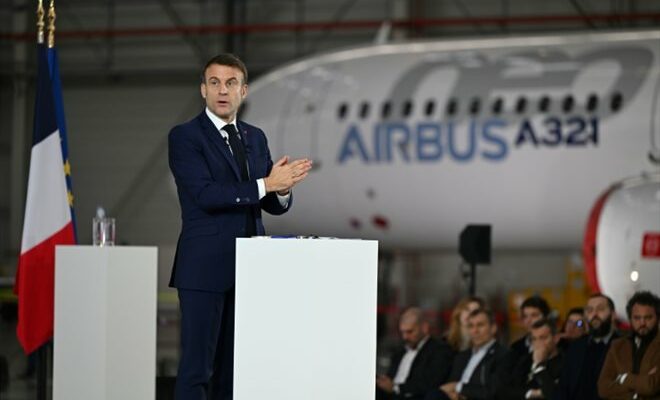Emmanuel Macron gives a speech in an Airbus factory, in Toulouse, on December 11, 2023, on the occasion of the two years of the France-2030 program (POOL/AFP/Caroline BLUMBERG)
Natural hydrogen for decarbonization, space cargo or electronic components for AI: Emmanuel Macron announced Monday in Toulouse new areas of development for France 2030, an investment plan dedicated to innovation that he wants to “accelerate”.
While the controversial immigration bill arrives in the hemicycle of the National Assembly, the president played counter-programming to, according to the Elysée, project himself in the long term and the means aimed at “mastering the technologies of ‘future and become leaders of tomorrow’s world’.
Launched in October 2021, France 2030 is allocated 54 billion euros, almost half of which has been committed. More than 3,200 projects carried out by 3,500 companies, half of them SMEs, and research centers benefit from public funding of around 30% of the sums invested.
“We must continue to accelerate,” said Emmanuel Macron on an Airbus site, during a progress report two years after the launch. “If we want to win this battle of disruptive innovation, we must go even faster and stronger,” he added.
He notably promised, “from the start of next year”, “very concrete” government measures in favor of “drastic simplification”, “hyper simplification” for businesses.
“We cannot have procedures that are twice as long as our American and Asian competitors,” he justified, also pleading for a public purchasing policy that favors, when possible, innovative solutions. “local” even if they are less attractive from a “budgetary” point of view.
France 2030 is part of its economic policy which aims for “three objectives”: industrial sovereignty, full employment, decarbonization, he recalled.
The plan has already made it possible to secure the production in France of one million electric cars out of the two million targeted, to develop eight biomedicines out of the 20 targeted, or even to bring about small space rocket projects and to finance research aimed at to develop a low-carbon aircraft, according to the Elysée.
Emmanuel Macron added several projects on Monday which will also be the subject of France 2030 funding.
In particular nuclear fusion, a nuclear reaction similar to that which powers the heart of the sun.
– CO2 capture –
“Fusion represents a path to explore, we know that much remains to be done,” he said, particularly in the development of superconducting magnets necessary for the operation of such a reactor.
He wants “within two years” a level of progress “as strong in relative terms as on innovative reactors”, small modular nuclear reactors (SMR) for which eight projects benefit from funding from France 2030.
In the area of decarbonization, the president announced the launch of “exploration missions” of natural hydrogen reservoirs throughout the country. This “white” hydrogen, naturally present in the subsoil, is arousing growing interest in the decarbonization of industry and transport.
A first exploration permit has just been granted and other files are being examined.
He also wants to map strategic minerals, essential to the decarbonization of the economy, such as lithium used for electric car batteries, nickel or cobalt.
The Head of State is also counting on the development of carbon capture and storage technologies. The objective is to decarbonize, by 2030, 10% of incompressible industrial emissions, or 8 million tonnes of CO2, through carbon capture techniques.

Emmanuel Macron gives a speech for the two years of the France-2030 plan, on an Airbus site, in Toulouse, December 11, 2023 (POOL/AFP/Caroline BLUMBERG)
In the field of health, he announced a roadmap for fundamental research through the use of algorithms and artificial intelligence (AI), and in space, the development of a cargo ship, step essential to consider one day embarking on manned flights.
And in the field of AI, it is counting on companies and the scientific community to “bring out components and system architectures for the massive processing of data in artificial intelligence with the objective of energy consumption which is divided by a hundred or a thousand compared to today’s standards.
Emmanuel Macron, however, regretted the European agreement to regulate AI, judging that it was “not a good idea” to regulate “more than the others”.
© 2023 AFP
Did you like this article ? Share it with your friends using the buttons below.




